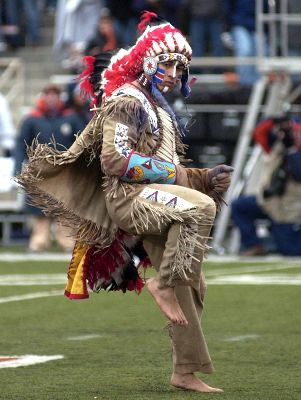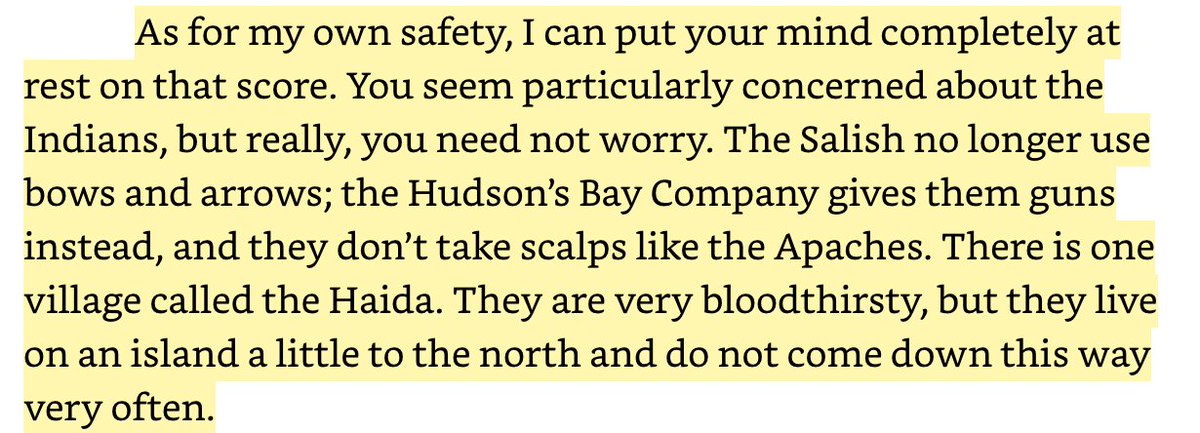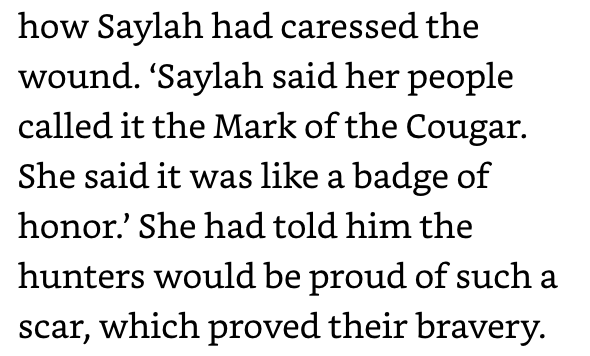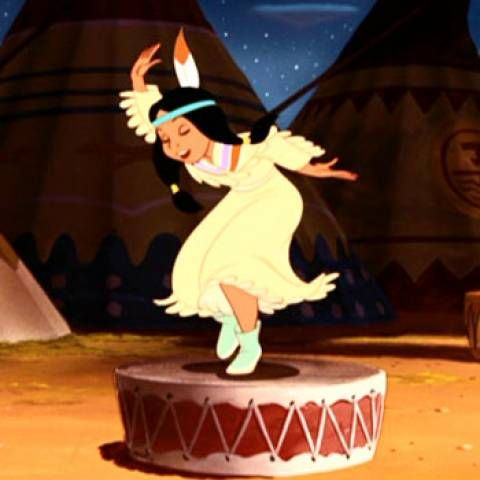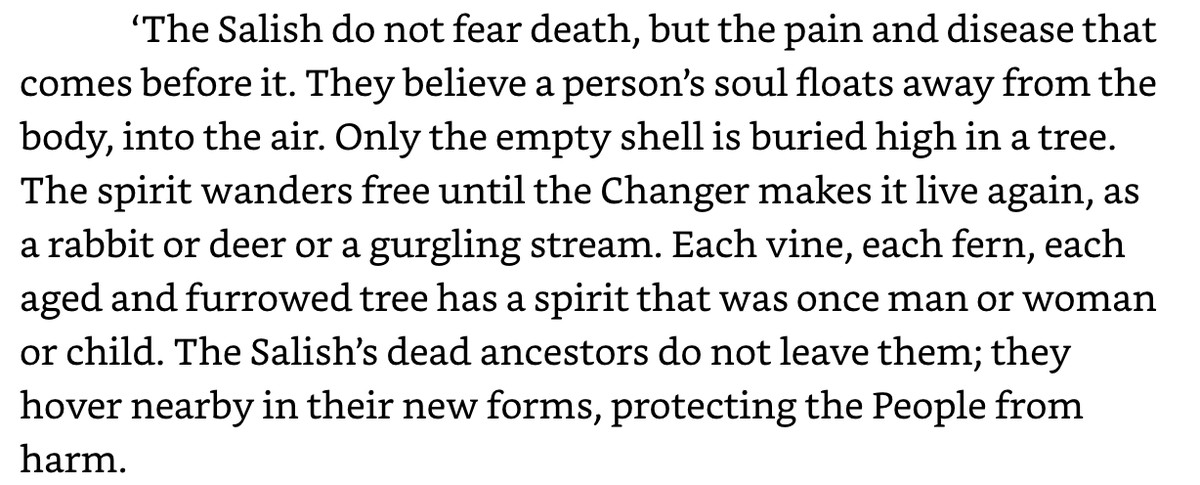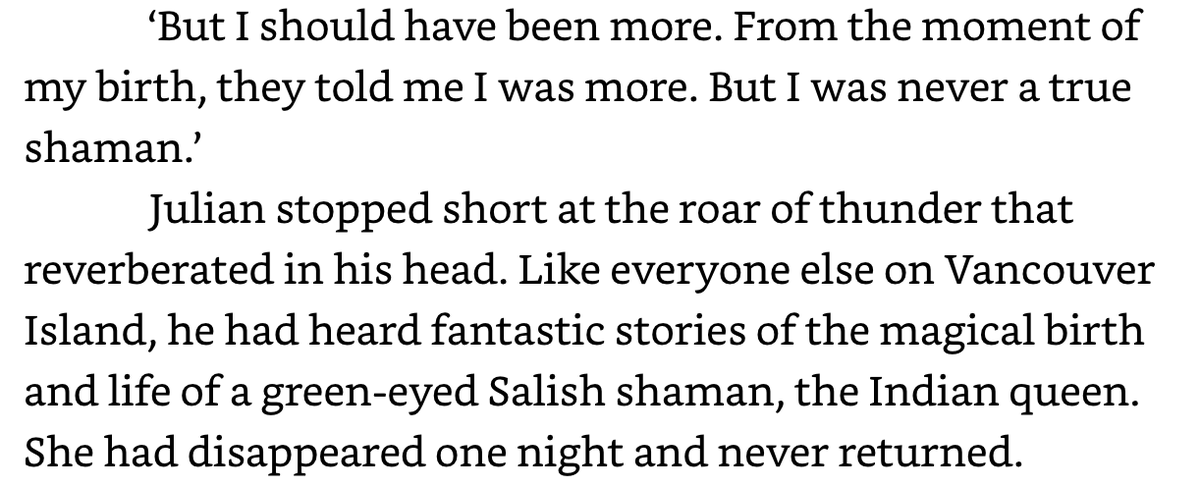One thing a lot of writers do that I find annoying: describing eyes of a Native person as "black eyes." That's in here 10 times. She doesn't mean from being hit or injured. She means the iris is black.
According to what Davis is telling her readers, that's the way the Salish ppl lived...
‘I am Salish,’ she explained. ‘I wore no shoes until I joined the missionary school,"
But, "Red Sweating Sickness" looks to be something Davis made up. The searches I do on that phrase lead to her bk or bks about her bk.
Sophia's dad is in Boston and didn't approve of Edward. He writes letters to Sophia.
As I read on, will Sophia tell her dad they're not savages--that "savage" is a stereotype and embodies bias?
Remember--the story Davis tells starts in 1861. By then, the Salish had already met Lewis and Clark and...
As depicted in this bk, there's very little contact with Whites until 1876.
Course, the main character of this bk has an absent white father, so.... there's that.
To refresh: the main char is meant to be a Salish woman abt 19 years old. When she was w/ her ppl (birth to 15), her name was Tanu. W/ whites, it is "Saylah" ("Sally Fisher"). The yr: 1876.
One day Saylah takes Theron out, to teach him how to shoot a bow and arrow. They take two bows that were hanging on the walls in the Ivy home.
Hmm... I'm quite skeptical of that!
But anyway, Saylah carves them, adds feathers, and she shoots one, hitting the target. Theron wants her to shoot a squirrel next.
"If you are genuinely hungry or the animal threatens your life, then is it allowed. The animals are glad to give up their lives to feed us, the Changer teaches.’"
Theron wants to know who Changer is; Saylah tells him Changer is another name for God. She goes into details on animals giving their lives, how it is a gift, but that...
Sigh.
But... she decides he needs a beaver skin to hold the arrows in... So off they go to find a beaver.
Note: obviously this "Salish" story is far from that... it is a white woman's imaginings.
That proposed use of a fresh beaver skin reminds me of the fresh skunk skins two Indian men wear in LITTLE HOUSE ON THE PRAIRIE.
THEY SEE THE COUGAR! It sees them! They hide in a log...
They find footprints. When she sees the cougar prints chasing the boys, she panics, remembering she had stopped it being killed.
Back at the house, Jamie (Julian's sickly father) comes out of his room and waits with the others. He tells them Saylah will find the boys.
In case I didn't mention it earlier, Jamie and Edward were friends at one time.
"Of sitting cross-legged near glowing coals, knee to knee with the other women, the salt air all around us."
Clearly, Davis knows not to use "Indian style." But why does she (or any writer) feel the need to describe how a Native person sits?! If she removed "cross legged" from the sentence, is anything lost? What does having it add?
Theron remembers Saylah saying that her people (Salish) call it "Mark of the Cougar."
She doesn't have a thought, at all, for the land, or her own people and what they've lost.
I know--that's not the story Davis wanted to tell. What DID Davis want to tell readers?
Drums? Oh...
‘Tonight it is a drum. Usually, you see, there are the drummers and the dancers. I had to think of a way to do both alone. I was lucky to find the well.’
"Not merely to move to the beat of drums, to the cadence of rattles and the sounds of the night, to change with the firelight, altered every moment by the breeze. To dance, yes, but also to celebrate. That is what I wish to teach you.’
She's also brought a bottle of whiskey for him to relax. Now, he takes a drink.
Until now, that cougar that she had stopped him from killing (that later attacked the two boys) had been between them.
But now, it "binds us in his beauty and his rage."
Later, Saylah tells Julian about Salish ways of understanding death. Again, Ms. Davis: what is your source?
Anyway, after they have sex she says she's leaving and that...
Back at the Ivy house, a priest is there now to give Jamie last rites. Saylah's not cool with it. The priest tells them that Jamie has sins that have to be cleansed so he has a chance to enter heaven.
Saylah tells the priest his religion is strange.
I bet ignorant readers think that's a great scene but they likely don't recognize the noble savage stereotyping throughout, and here, too.
Jamie is dying and tells Saylah he no longer believes in his own faith. Now, he believes in her.
Native songs are sung in Native languages. Many (most?) songs are composed, in large measure, of vocables rather than a words.
Sigh (again).
Saylah and Julian are in the forest. He tells her he loves her; wants her to say it back but she doesn't want to because it'll make her feel vulnerable and open to hurt again like when her ppl turned away from her. She gives details:
He tells her they needed her to be that for them, and that he needed her to be"a gift from God" for him. But now, he sees her as a woman who is dear to him, not for her magic or wisdom but for her heart.
She goes to him and says "I am Saylah. And I love you."

